Rain or shine, we are always ready to serve
On a May morning, the first sunshine of the season began to be intense. The road leading to Sen and Hoang Tru villages (Kim Lien commune, Nam Dan district, Nghe An ) became more bustling. Looking at the parking lot full of cars and groups of people coming to visit Uncle Ho's house, the receptionists at the Kim Lien National Special Relic Site were very happy, although they had to work much harder.

Uncle Ho's family house in Sen village, where he lived from the age of 11 to 16.
PHOTO: K.HOAN
"We represent Uncle Ho's family to receive guests and are very happy to see that everyone has sincere feelings, respect and love for Uncle Ho's family. Rain or shine, we are always willing to serve and are very happy to welcome anyone who comes here," said Ms. Hoang Thi Hoai Thu (38 years old), a tour guide at Kim Lien National Special Relic Site.
Ms. Thu and Ms. Nguyen Thi Hai (40 years old) were assigned to be in charge of explaining in Sen village, Uncle Ho's paternal hometown. The Kim Lien special national relic site has free pick-up points: Uncle Ho's paternal hometown, maternal hometown and the tomb of Mrs. Hoang Thi Loan, Uncle Ho's mother. The paternal hometown, where the young Nguyen Tat Thanh lived from the age of 11 to 16, has been restored and is preserving a simple thatched house, nestled under a bamboo grove and areca trees in Sen village. Inside the house are the daily necessities of a Vietnamese village in the early 20th century, kept almost intact.
Receiving me at the corner of Uncle Ho's family garden in Sen village, Ms. Thu and Ms. Hai interrupted the conversation many times because they took turns explaining to the groups of visitors. Under the hot sun of May, Nghe's voice was as gentle as a lullaby: "Earlier, we visited Hoang Tru, Uncle Ho's maternal hometown, where he was born and spent the first 5 years of his life. Now, I'm taking you back to Sen village, his paternal hometown, the land where Uncle Ho lived from the time he was 11 years old until he was 16 years old."
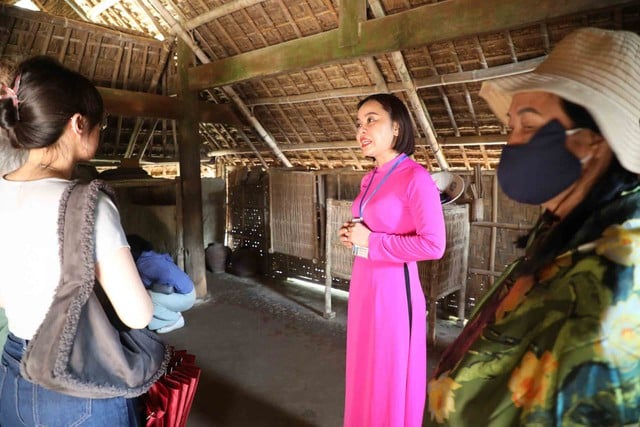
Ms. Nguyen Thi Hai tells stories to tourists in the house where Uncle Ho's family used to live in Sen village.
PHOTO: K.HOAN
"The Sen village relic site was born in very special circumstances. In 1901, Uncle Ho's father, Mr. Nguyen Sinh Sac, took the exam and passed the exam. For the first time, Sen village had someone who passed the exam, so the villagers built him a 5-room wooden house to celebrate his passing. The 3-room house was a gift from his brother Nguyen Sinh Thuyet to celebrate his passing. In 1957, when he returned to his hometown for the first time, Uncle Ho saw a sign in front of the gate saying "House of President Ho", he smiled happily and said this was the house of the deputy. He meant that thanks to his father's merits, he had this house and a large plot of land. But unfortunately, when Uncle returned here, his family only had 4 people left: Mr. Nguyen Sinh Sac and 3 children. His mother, Mrs. Hoang Thi Loan, passed away in Hue when she was only 33 years old, and his younger brother Nguyen Sinh Xin passed away before he was 1 year old", Ms. Thu's voice dropped. The group of people stood around, quietly listening attentively.
Ms. Thu said that on June 16, 1957, during his first visit to his hometown, when the helicopter carrying Uncle Ho landed at Vinh airport, Uncle did not get into the car that had been prepared by the Nghe An Provincial Party Committee, but instead got into a security car parked nearby. Knowing that the Provincial Party Committee leaders were worried about his safety, Uncle Ho gently said: "No one can protect me better than the people."
"Returning to his hometown after many years away, Uncle Ho wore rubber sandals, dressed simply, and was close to his neighbors. Returning to his hometown, Uncle Ho asked about Mr. Phuong, an old man, the poorest in the village. He asked about Mr. Dien's blacksmith shop... He still remembered clearly the entrances, the gate, the placement of furniture in the house, the trees, relatives, the village...", Ms. Hai added.
On the day Uncle Ho visited his hometown, a leader of Nghe An province asked Uncle Ho for permission to plant flowers in his garden, but Uncle Ho said that sweet potato flowers were still beautiful. To this day, this garden is still planted with sweet potatoes, beans, and peanuts depending on the season. "That day, Nghe An Provincial Party Committee arranged a meal to invite Uncle Ho, on which there was a plate of pickled eggplants. After everyone finished eating, there were 2 eggplants left on the plate. Uncle Ho took one for Mr. Nguyen Truong Khoat, Secretary of the Provincial Party Committee, and put the other in his bowl. Uncle Ho said: "Don't waste the people's money. Every penny and bowl of rice we use is the sweat and tears of the people. Loving the people means saving, wasting is not loving the people," Ms. Thu said.
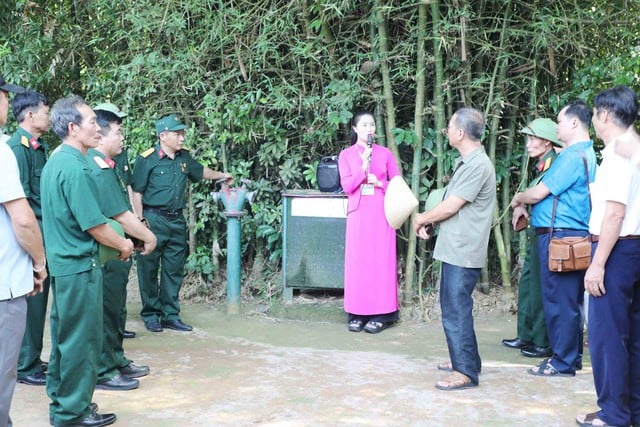
Description of Uncle Ho's family life in his maternal hometown Hoang Tru
PHOTO: K.HOAN
Tell stories about Uncle Ho to learn from him
The Kim Lien special national relic site has nearly 20 tour guides at 3 locations: Uncle Ho's paternal and maternal hometowns and the tomb of Mrs. Hoang Thi Loan. Ms. Tran Thi Thao, who has been providing tour guides at Uncle Ho's hometown for 36 years, said that the time when the number of visitors is highest is during the hot season, the work intensity is very high, but the love for Uncle Ho and his family makes her forget all the fatigue.
Ms. Thao said that in 2006, a retired military leader in the south visited Uncle Ho's hometown. After returning, he wrote a very long letter thanking her for explaining and conveying information about Uncle Ho's life. "You told the story of Uncle Ho's life, conveyed emotions very well, very touching, touched my heart. Studying and following Uncle Ho's moral example really needs people like you," he wrote.
"The work is hard, but encouragement like that makes us very happy. I still keep that letter as a souvenir," Thao shared.
Ms. Phan Thi Quy, Deputy Head of the Propaganda Department of the Kim Lien National Special Relic Site, who is also a tour guide, said that once she gave a tour guide to a group of Japanese tourists in Vietnamese. Although she did not know Vietnamese, the Japanese tourist still listened attentively. Before saying goodbye, he told the interpreter: "I heard it like a melody", "I read the sincerity in her eyes". "The respect and listening of the guests brought me a very strange feeling, a feeling that comes from expressive language. Our happiness is a tight handshake or a gentle hug from those who return to Uncle Ho's hometown", Ms. Quy said.
Mr. Nguyen Bao Tuan, Director of Kim Lien National Special Relic Site, said that the work here is very hard, there are months of work without a day off, but everyone does their best with responsibility and love for Uncle Ho's family. The staff learns foreign languages (English, French, Lao...) to explain.
"Working here, in this environment, we learned many things from Uncle Ho. We always put friendliness and attentive service attitude above all else. When coming here, leaders and ordinary people are treated equally and with the same respect. We always remind each other to always study to improve our knowledge and service skills. When there are few customers, we arrange for presenters to give talks at schools and offices. Telling stories about Uncle Ho to learn from him, small stories, but listeners will receive valuable lessons in them," said Mr. Tuan.
Source: https://thanhnien.vn/hoc-bac-tu-nhung-cau-chuyen-nho-185250518212739059.htm



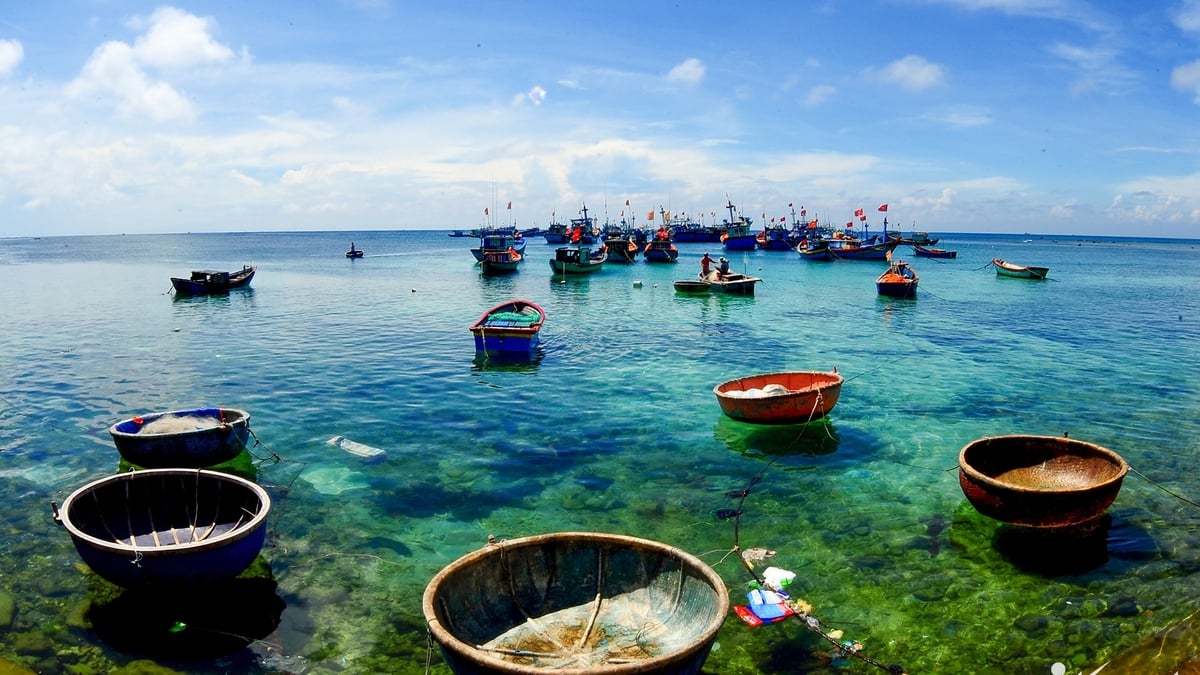

![[Photo] Special flag-raising ceremony to celebrate the 135th birthday of President Ho Chi Minh](https://vphoto.vietnam.vn/thumb/1200x675/vietnam/resource/IMAGE/2025/5/19/1c5ec80249cc4ef3a5226e366e7e58f1)
![[Photo] Party and State leaders visit President Ho Chi Minh's Mausoleum](https://vphoto.vietnam.vn/thumb/1200x675/vietnam/resource/IMAGE/2025/5/19/d7e02f242af84752902b22a7208674ac)
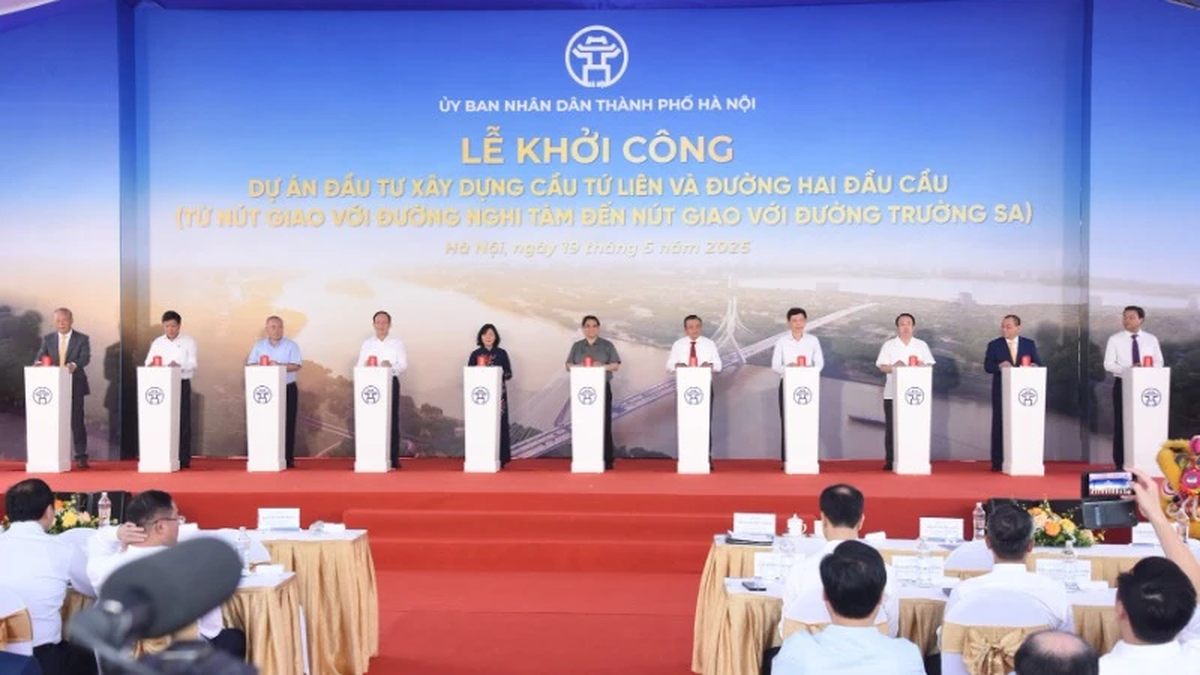

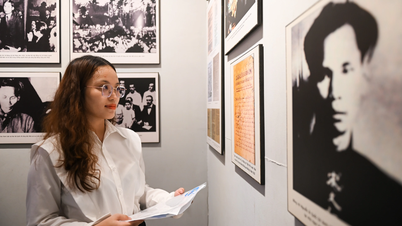



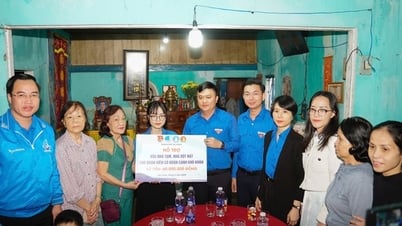

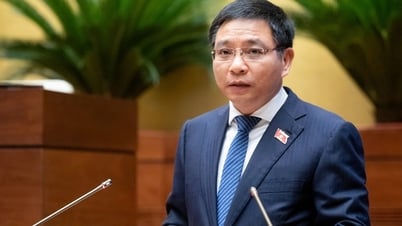
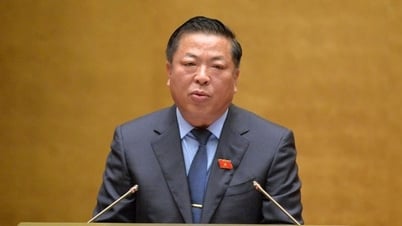




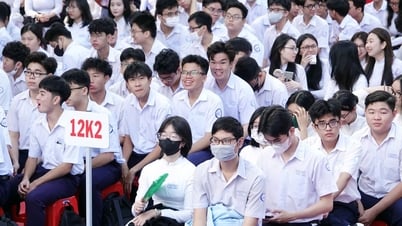

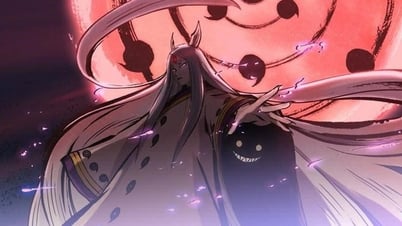
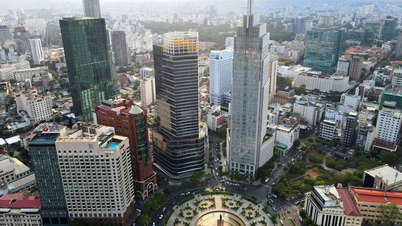

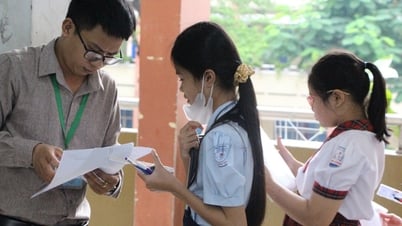


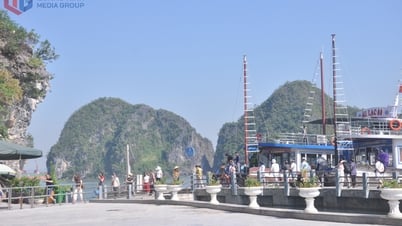
















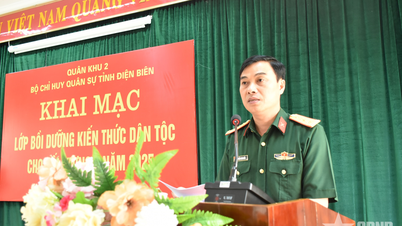



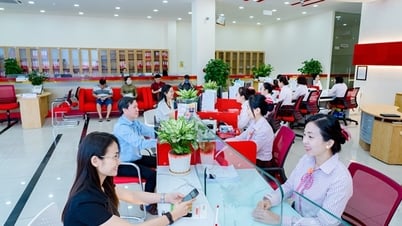

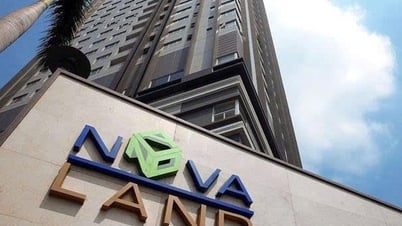
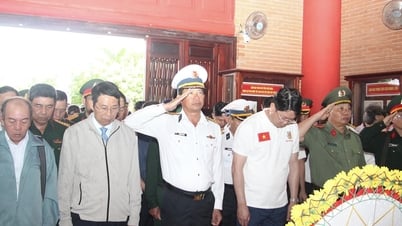



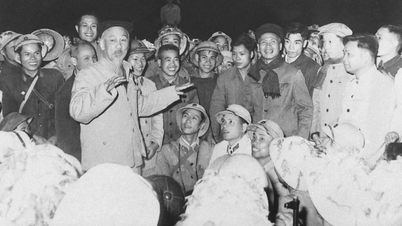



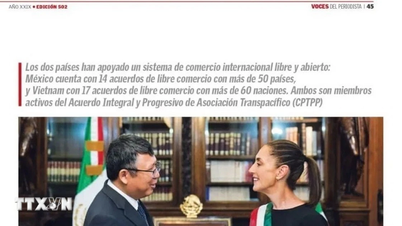

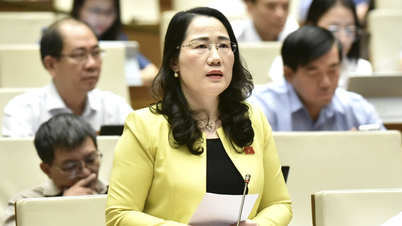




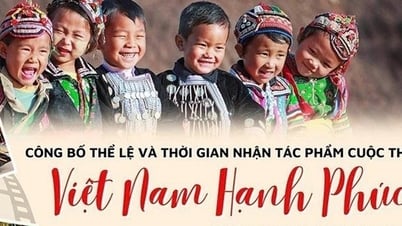
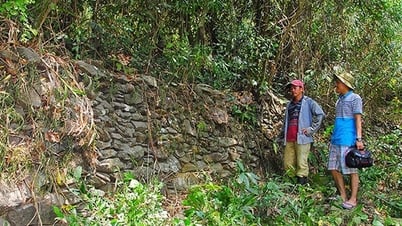

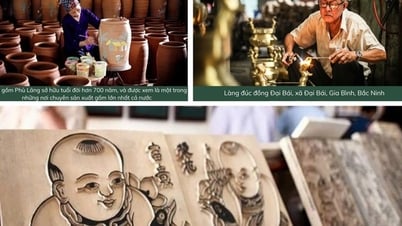
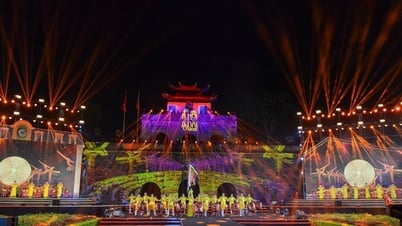

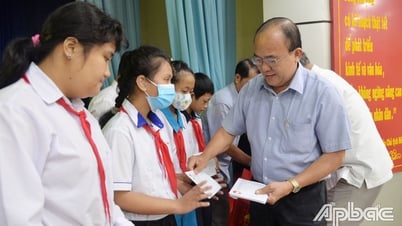


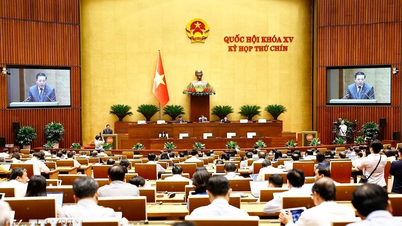

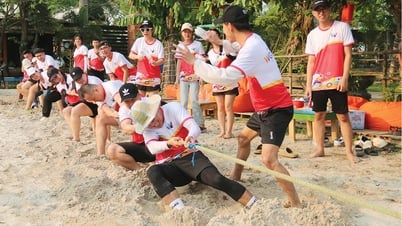
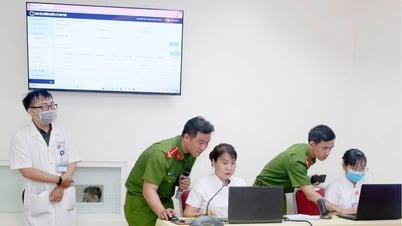
![[VIDEO] - Enhancing the value of Quang Nam OCOP products through trade connections](https://vphoto.vietnam.vn/thumb/402x226/vietnam/resource/IMAGE/2025/5/17/5be5b5fff1f14914986fad159097a677)







Comment (0)